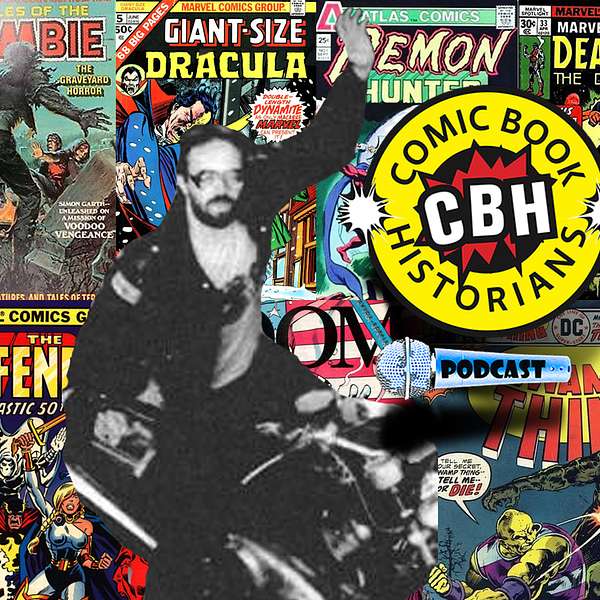
Comic Book Historians
As featured on LEGO.com, Marvel.com, Slugfest, NPR, Wall Street Journal and the Today Show, host & series producer Alex Grand, author of the best seller, Understanding Superhero Comic Books (with various co-hosts Bill Field, David Armstrong, N. Scott Robinson, Ph.D., Jim Thompson) and guests engage in a Journalistic Comic Book Historical discussion between professionals, historians and scholars in determining what happened and when in comics, from strips and pulps to the platinum age comic book, through golden, silver, bronze and then toward modern
Support us at https://www.patreon.com/comicbookhistorians.
Read Alex Grand's Understanding Superhero Comic Books published by McFarland & Company here at: https://a.co/d/2PlsODN
Series directed, produced & edited by Alex Grand
All episodes ©Comic Book Historians LLC.
Comic Book Historians
David Anthony Kraft: Rock N Roll Journalist and Comic Writer Part 1 with Alex Grand & Jim Thompson
Alex Grand and co-host Jim Thompson interview David Anthony Kraft from his humble beginnings in the late 1960s becoming the agent of the Otis Adelbert Kline, Publisher of Fictioneer Science Fiction Books, his early 1970s Marvel work with Roy Thomas, his work at Atlas Comics in 1975 with Chip and Martin Goodman, Giant Size Dracula with Marvel new comer John Byrne, working under Gerry Conway at DC Comics, his editing run on FOOM under Sol Brodsky, his Marvel Defenders run under Stan Lee working with Keith Giffen and Carmine Infantino all discussed in this first part of a 2 parter. Edited & Produced by Alex Grand. Images used in artwork ©Their Respective Copyright holders, CBH Podcast ©Comic Book Historians. Thumbnail Artwork ©Comic Book Historians. Support us at https://www.patreon.com/comicbookhistorians
Alex: Welcome again to the Comic Book Historians Podcast. I’m Alex Grand with Jim Thompson. Today, we are interviewing rock n roll comic writer, journalist, publisher. You can see his latest work with Yi Soon Shin, Y-I- S-O-O-N- S-H-I-N, graphic novel available on Amazon.com, David Anthony Kraft. David, thanks for joining us today.
Kraft: Hey, my pleasure.
Jim: David, the way we like to start is by going back to your very beginnings: where you were born, when you were born, when you first started reading comics…
Kraft: Oh my god, you’re opening a whole topic. Here’s the problem I have with that. And you’re like, “How could you have a problem with that?”
Well, people always assume where you were born or where you’re “from” somehow defines you. Here’s how I put it. You know when an airport is jammed up and the planes are circling, waiting permission to land, if there was such a thing as re-birth and stuff, which I’m just using as a metaphor… I as circling waiting to land, in the South. And, “I got fucked at the drive through,” as Pesci used to say.
Alex: Ha!
Kraft: I got dropped at the fucking Canadian border! So no, that’s not where I’m from. I ran away from there when I was five. My picture’s in the front pages of the paper when I was 14, missing in action, trying to get to the South. It doesn’t really define me.
[chuckles]
Alex: Right.
Jim: I wasn’t asking for definition. I get it. I’m a southerner myself who left and moved to California, using law school as a trick to get there…
Kraft: [laughter] Excellent! I had to join the carnival and travel in order to get here. [chuckle]
Jim: But even if you simply say, I’m not from New York City, that gives us something that we don’t get with any other interview that we’ve had since the beginning.
Alex: Yeah. Most of the people are from the Northeast.
Kraft: Well actually, I feel more- I am not a city kind of guy. Like Conan, I was born on the battlefield, in 40 or 50-degree below weather, and all that sort of stuff. I spent my youth, trying to get out of there. If I were a city person, it would be Manhattan. That is the best.
Jim: And that’s where you arrived at some point, on a motorcycle? Is that right?
Kraft: Yes. [chuckle] Here, I’ll give you a little behind the scene. When I was in high school, you know, when you’re at a certain age, you don’t know your own boundaries. You have no idea what you don’t know, which is kind of like everything. You think you know it all.
I decided to apply for every kind of editorial job there was. Including, The New Yorker, the magazine. Well, what would a guy, from where I was from, know about The New Yorker? [chuckle]
I loved the Edgar Rice Burroughs books, and his closest competitor was Otis Adelbert Kline…
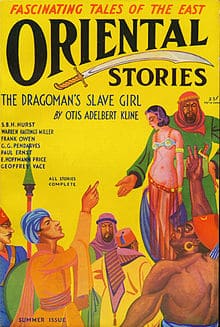
Alex: To whom you are a literary agent for the estate.
Kraft: Yeah. Since I was 16. Well, since I didn’t know my own boundaries. I talked to Kline’s daughter, and I asked if he had an agent, because he had died years before. If there was somebody representing his work. And she said, “No.” And I said, “Well, That’s me then.”
I said, “What have you have to lose?” If I don’t sell anything, you’re exactly the same. And if I do, voila!” I became Kline’s agent, in high school.
Alex: What year was that, roughly?
Kraft: Oh, good Lord… 1842? Something like that.
Alex: 1842? That’s a while ago. All right.
Kraft: Yeah. A bit ago. Anyway…
Alex: This is what? The early ‘70s though, right?
Kraft: No, this was in the ‘60s.
Alex: Late ‘60s, okay.
Kraft: Anyhow, that’s how I got to Marvel. Because he’s kind of been my guiding light or my, you know, whatever. When DC got the rights to do Edgar Rice Burroughs’ Tarzan and John Carter, and so on, there was a bidding war behind the scenes between Marvel and DC, and DC won.
Since I was Kline’s agent, Roy Thomas who was editor in chief at that time, contacted me. Because having not gotten Burroughs, they wanted to get Kline. That would have all gone swimmingly and it was meant to be.
Later on, in Creatures on the Lose, they had Gulliver Jones of Mars, which is based on the old book by Arnold. They tried to get Kline, and at the time, there were some hard cover books, and the publisher had a stake in it. It’s If there’s any subsidiary rights sold, then he would participate. He was so greedy; he queered the deal.
I used the chance to go, “Hey, Roy, can I write for Marvel?” And Roy said, “Sure, but we don’t have enough work for our existing writers. But go ahead and submit something.” Being practical, I didn’t submit anything because I thought, well, if they don’t have work for the existing writers, they’re not going to have work for me.”
There’s the very long story leading to this. Later on, when I got to the South, I was editing a metaphysical magazine, when… I knew I was going Marvel. There was no doubt about that. I thought, I would have to go there, sort of camp on the doorstep and somehow, you know… get in there.
Jim: And this is because you were a big Marvel fan early on, right?
Kraft: Oh yeah. Yeah, absolutely. I quit DC Comics when I was seven or eight. Me and my best friend decided they were just totally stupid.
[00:05:00]
Alex: Ha!
Kraft: I would not have had a so-called comic career if it weren’t for Stan and Jack. Because comics used to be dumb. When I got into Marvel, I was like, “This is what I want to do.”
Alex: Right. So, based on Fantastic Four? Was that’s your main comic?
Kraft: No, I’m actually… I bought the original Hulk stuff when I was in grade school, before it was Marvel. When you’re that age, you don’t follow it. It’s not like today where you know that these are all part of some continuity.
But later on, I saw Jim… Warren Magazines had a publication called Screen Thrills Illustrated, and this is really rare in publishing, especially at that time. They wrote an article about the Republic Movie Serial, Captain America. And don’t ask me, I wasn’t alive in those days, but I always was interested in stuff like that, and they have a picture of Avengers #4. The cover was Cap coming back.
That cover, Kirby’s art, I had to have it. I haunted the newsstands until the book came out. I was always into pretty much the Avengers. You know, Cap, and Thor, and The Hulk, and not as much, Spiderman. I didn’t get around Spiderman till issue 19.
Jim: You were a letter writer too, right? You got…
Kraft: Oh, yeah. Yeah. All of us were. I mean, if you think about it. Everybody who later ended up there. I probably…
Jim: Were you published much or just that one Hulk issue?
Kraft: A couple. Here and there. I think they may have both been Hulk, I’m not sure. Because I was a big Hulk guy.
I didn’t bother to submit. And then, a few years later I was editing a metaphysical magazine in Northeast Georgia, which is actually where I am right now. I got a letter from Roy. He needed an associate editor, and he thought of me.
Alex: Oh, cool.
Kraft: You never know, when you throw a rock in the pool, where the ripples will lead, so I kind of owe it to Kline.
Jim: Was this in ’74? Was this when you started doing work for the Marvel black and white magazines?
Kraft: Yeah. He contacted me in early ’74. Well, the thing is, in the meanwhile, of course, I had sold some tech-science fiction to Amazing Stories and some comics stories to Skywald.
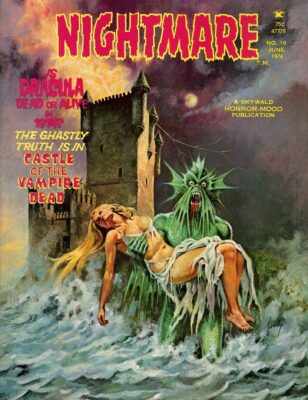
With that characteristic, not knowing your limitations thing, I had cold called Sol Brodsky at Skywald, with all the confidence of somebody who’s in high school. I was like, “I need to write for you.” Thanks to him, he agreed, and I did a few stories for those magazines.
Jim: Were those your first published comics, the Skywald stuff?
Kraft: Yeah. That was before.
Alex: That’s great.
Kraft: Yeah, before Marvel.
Jim: And then Atlas? I just want to get the trajectory right. Tell us about you going over to Atlas.
Kraft: Okay. Let me segue neatly into that.
Jim: Okay.
Kraft: Roy hired me at Marvel, and that was great. I had about a year at Marvel.
Alex: Because yeah, you contributed Tales of Zombie 8… And then…
Kraft: Oh yeah. It’s actually the first magazine… I say this, I was proud then with the sense of irony and I’m still feeling that way today. My first credit, as an editor was on co-editing with Don McGregor on Tales of the Zombie.
It was funny because I used to love reading The New Yorker Magazine, which is perceived as miles away from Tales of the Zombie. I would read The New Yorker and then I would proudly go to my job as editor of Tales of the Zombie. [chuckle] I got a lot of stuff out The New Yorker, including Hellcat’s speech pattern. You know, like cheese and crackers… Your sources are where you find them.
I was at Marvel for a year, and what happened is, and it’s not intentional, and it still happens today. Whatever kind of thing you’re writing, you kind of get pigeonholed. When I got to Marvel, because I had already written horror stuff for Skywald, I was a horror writer.
Alex: Yeah, because you did the Giant-Size Dracula 5 the first John Byrne art story from Marvel.
Kraft: Yeah. Here’s the thing, I was happy to have that and happy to be at Marvel, but I didn’t want to write horror. I wanted to write the actual Marvel superheroes.
Jim: And you get that, by force, almost with Man-Wolf, didn’t you? Because that was a horror book and you turned it into a superhero book.
Kraft: Yeah. Well, the thing about Man-Wolf is they already had Werewolf by Night, which is basically kind of a rip off Wolf-Man, the Universal Movie werewolf. Why did they need a third rate one? And really, what they’d done with him was he ran around and growled and menaced people when the moon was out. It was like I saw no future for me or the book. I don’t want to write something that stereotypical.
I’d written a novel when I was in high school, and I went to Roy and said, “I want to just kind of adapt it to Man-Wolf and make him into a star-god, take him to space.” I thought Roy would say no, but he was like, “Great!”
One thing really wonderful about Roy, he did not micromanage. If you messed up, he or Stan would call you on the carpet. I just made it a policy never to mess up, so I never got called on the carpet. Once he said that, I was off and running.
Jim: How did George Pérez get on that book?
[00:10:02]
Kraft: Me. [chuckle]… What happened was George Tuska was drawing it. They had some other assignment for him, which kept him busy. He didn’t have time to do that issue of Man Wolf.
We were talking, sort of off microphone, about how people help each other out behind the scenes. George had been helping Rich Buckler, ghosting some of his work. He had done… I think the only thing in color that had been published was a Deathlok thing that featured Rich and Doug Moench.
He got his shot on the first issue of the Man-Wolf that I wrote. I liked it so much, he was supposed to just be a fill-in. I pulled the mom and dad trick on John Romita and Roy Thomas. I went to Roy and I said… Because George had… If you look at those issues, the movement, the action, the excitement, everything that’s Marvel is there. And I wanted that. I went to Roy and I said, “Can George just be the regular guy on Man-Wolf?” And Roy was like, “It’s okay with me if it’s okay with John Romita.” who was the art director.
I went to John Romita. We used to play softball on Friday afternoons in Central Park. I went to John Romita and I said, “Roy says it’s okay if I have George Pérez on the book. Do you have any objections?” [chuckle] And he was like, “Well, if Roy says it’s okay… “So that’s how I got George on there as the regular guy.
Alex: That’s awesome.
Kraft: I always like working with George. We worked together on Logan’s Run. I was packaging the Beatles’ Book for Marvel, and I hired him for that. It’s always fun working with him.
Alex: With George, yeah.
Kraft: Yeah. Anyway, since this is about Atlas, right?
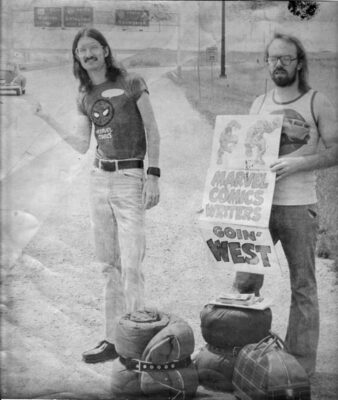
Jim: Yep.
Kraft: After a year at Marvel, Stan’s brother, Larry Lieber got hired at Atlas as editor. He called me and offered me the job as his associate editor. Well, I was pretty young. I did not have the experience to know or to think, “I wonder if Atlas will last.” I was flattered, of course, and also, they were doubling my salary that I was getting at Marvel, on staff as an editor.
Alex: Yeah, it’s important.
Kraft: Who can resist that, right? I went to Atlas, as Larry’s associate editor. That’s where Rich and I did Demon Hunter. I thought I had it made. And the thing about Larry is, Larry is a hard worker. He didn’t really delegate much to me, so I went to the publisher which was Chip Goodman and I said, “I’m not a clock watcher, I like to do things. And I just need to do stuff. I can’t just… I love the salary but, you know, give me some damn work.”
Chip said, “Well, we’ll divide the line between you and Larry.”
And I said, “No, no, no. Larry hired me, I’m not going to stab him in the back by having half the line. That’s not what I’m talking about. I just want him to delegate some stuff to me.”
Jim: Was Rovin gone at this point?
Kraft: Yeah.
Jim: Okay.
Kraft: There’s a lot of stuff that I overheard, said about Rovin, but best left off any recorded thing. They were pretty unhappy with him at the point that I got there.
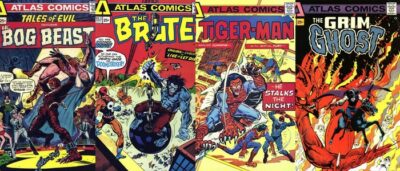
Alex: How was Chip Goodman and Martin Goodman? You met both of them? How were their personalities?
Kraft: Yeah… Have you ever seen the movie The Man With X-Ray Eyes starring Ray Milland?
Jim: The Ray Milland movie.
Kraft: Yeah.
Jim: Yep.
Advertisement
Kraft: Well, my one and only meeting with Martin Goodman, that’s who he was.
[laughter]
Kraft: He came out of the elevator and he was very short.
Jim: That’s scary.
Kraft: And he looked just like a Jack Kirby drawing with the hat and the suit, and everything. You know, from the early Marvel books? Or even before, the monster stuff. And everywhere he looked there were X-ray beams that destroyed people and things.
Alex: Ha!
Kraft: He was tremendously angry, I did not, again, put it together why. It turns out, I guess, Atlas was losing money hand over fist. I didn’t know that. Chip on the other hand, it was a great office because he also published Swank magazine. There were always these hot girls coming and going, which was cool.
I did not know then, but I have heard since then, that apparently Chip was gay. I did not know that.
Alex: Oh, okay. Chip Goodman was gay. I didn’t know that either.
Kraft: Well, I’ve heard that. Like I said, I was all about work. I was kind of oblivious to things. Yeah, there were always cute girls coming and going and stuff. It was a small office, it had an open, sort of production department that was Alan Kupperberg and Shelly Leferman.
Alan Kupperberg designed that stylized Atlas A and Shelly lettered stuff, including Demon Hunter. Chip’s office is right beside my office which was Larry’s office. We had adjoining desks. After one particularly hard day, Chip showed up at the door with martinis, and he was like, “I heard what you guys went through today. You deserve a drink.”
I was like, “This is the kind of publisher to have.” [chuckle]
Alex: Wow. So he was actually a pretty cool guy.
Kraft: Yeah. At least as far as my experience… Anyway, we’re jumping around because we’ll have to come back to Demon Hunter.
Jim: Oh, we’re coming back to Demon Hunter, yeah.
Kraft: After I was there for a while, I got assignments to write three books on a regular basis. One of them was Demon Hunter, and there were a couple of others., I decided…
Jim: Do you remember what the others were?
[00:15:00]
Kraft: One was one that I had pitched to them but it never made it. I think the other one might have been…
Jim: Was that the beast one? I mean there was the spin-off of from Demon Hunter. Was that it?
Kraft: No. No. It wasn’t that. I think it was called Blood Hawk. And then one of the other books, which, it’ll occur to me in a minute, because if I chase it, it’ll keep being elusive. I basically had three books to write. I was going to pull a Steve Englehart.
At that point, I went freelance. I was going to move to the West Coast, because now I had all these books to write. And I just want to jump back to say, when I had complained to Chip about not having enough work, at that point, Larry let me start writing the cover copy and some other stuff like that. I got to have some fun with that.
Alex: Oh, cool.
Kraft: Anyway, so I hopped on my motorcycle, and I went to the West Coast, secure in the knowledge that I was the new Steve Englehart. When I got to the West Coast, Atlas had gone defunct and I had no work.
[chuckles]
Alex: Yeah. I’ve heard that story before. That by the time you got there it was, the party was over.
Kraft: Yeah. I was on top of the world and then there wasn’t a world. I spent the summer on the West Coast, and I realized, I did not belong among mere mortals. Because, at the Marvel bullpen, and at Atlas because a lot of the same people crossing back and forth, you know you could go out to a movie, and then sit around afterwards and talk about why you liked it, didn’t like it, what the technique was, how this work and what they had done there to make that work, my kind of stuff.
Out in the regular world, people just go, “Yeah, it’s a pretty good movie.” Well, that didn’t really work for me. [chuckle] I called Jim Salicrup, a good friend of mine from the early days, and I said I wanted to come back, and Roger Slifer was too. Roger and I started the on same day at Marvel.
They had just fired 13 people. What Marvel used to do is, we all knew it, at the staff level, for some reason, management didn’t seem to know it. What would happen is, there was a big lag between when a book was published and when Marvel got the actual sell-through on it.
Obviously, the book sold better in the summer, and worse in the winter because of accessibility and so on. Every summer, they would get the winter sales figures and they would fire people. Every winter, they’d get the summer sales figures, and they would hire people.
Alex: Yeah, because it was off-cycle.
Kraft: We used to say, why don’t they just notice this and average it out or something. Well, anyway, they had just fired 13 people when I wanted to go back, because it was the summer, they’ve gotten the winter sales figures.
Roger was like, “I don’t know if you have much of a chance, they’ve just been firing people left and right.” And Salicrup was like, “Yeah, but you’re that. You always do okay. You’ll be fine.” And you know, thank God for Salicrup.
Anyway, I went back and things were fine. In fact, the actual… We are really out of chronological order but the first thing that happened was, when I went by the bullpen, I came in the front door, where the receptionist was, and then you’d come in and there was an office on your right that had Irv Watanabe the letterer, and various people. And then when you turn the corner, there was Larry Lieber’s office. He was back at Marvel, after Atlas and doing the British books. I was on my way to him because I knew he would give me work.
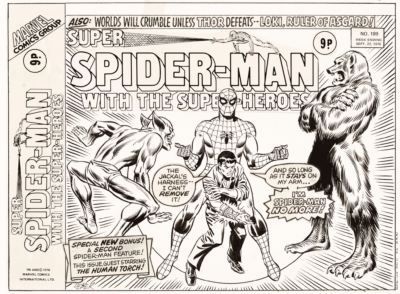
Britain used to divide one of the short Marvel comics into three parts, believe it or not, for publication in England. And they needed new splash pages. They would divide them mechanically, could be in the middle of a conversation like we’re having and it’ll be like, “Okay, to be continued.” And then you have to come up with a splash page. Crazy stuff but I worked intermediary splashes for all the Marvel stuff basically.
Anyway, that was later… I came in, I rounded the corner and standing in Larry’s doorway was Rich Buckler. We had a reunion. And we decided then and there, that we should do Devil Slayer.
Rich was working on… Well, he didn’t even have a plot but he was working on what became… I’m trying to remember what it was published as. It was one book and then they switched it over, but Marvel Spotlight 3, I think it was.
Alex: Right.
Jim: Was this the Deathlok tie in?
Kraft: Yeah.
Jim: Okay.
Kraft: It was originally scheduled to go in to Astonishing Tales or something, but he didn’t have a plot. When I bumped into him, I was like, “Hey dude, how you doing? We should do this character called Devil Slayer,” because Atlas was defunct.
Jim: Let me ask you a question on that. Let’s go to Demon Hunter, Devil Slayer, all of that. Did you consider yourself co-creator of that in the beginning or was it, you mentioned that it was his baby. Is it his baby or…?
Kraft: Well, it was his baby, except it wasn’t. [chuckle]
Jim: That’s what I’d like to explore a little bit.
Alex: Yeah, is the character a co-creation?
Kraft: Rich was a great guy, and I loved talking rock with him because he was plugged in to all the rock stuff. Here’s the advantage that artists have, and that’s why they should all be bitch slapped. They can work and listen to TV or movies, or music. As a writer, because of the word thing, there’s no way to be writing words and listening to other words. They have this unfair advantage.
But anyway, Rich was always in to music and stuff. We used to talk about it at Marvel before and stuff, and then at Atlas, then back at Marvel. Rich also, they all say don’t speak ill, and I’m not really speaking ill, I’m just speaking reality.
[00:20:02]
Rich would over commit. Then he would skate by with really kind of weak stuff. [chuckle] If you look at that first Devil Hunter. He turned in, I wish I still had the Xeroxes. There’s a point at which there’s a yacht, and I wrote off of the arc, I mean in Marvel style. And the artist, who actually finished the work, or worked it off of what Rich turned in… Well, there’s a whole page, and there’s a big shot of a yacht, and Rich put a little circle going, “Yacht goes here.”
[laughter]
There wasn’t even anything to ink. When you look at it, it looks kind of unfinished. It’s unfinished because they did the best they could, with nothing much there.
Alex: The inker put the yacht there. That’s funny.
Kraft: Yeah. Rich was enormously talented but he spread himself way too thin. What happened was, I was meant to dialog Demon Hunter, but in the end, I ended up co-creating the damn thing because it was so thinly done. There wasn’t anything there. There’d be pages that were inexplicable, and I would just puzzle over them, I’d be like, “What in the hell is supposed to be going on here?” So I just made stuff up and, viola!
Alex: So, out of necessity, you are the co-creator of the character.
Kraft: Yes. [laughter] I signed on to dialog, and I ended up kind of inventing it with him. He had the original concept, and sold it to Chip. Whatever the hell he was thinking was not on the page.
Alex: That’s interesting. When you were doing the Marvel UK stuff, you were also, in ’76, you did some DC titles too, right? Like Richard Dragon, Kamandi, Swamp Thing.
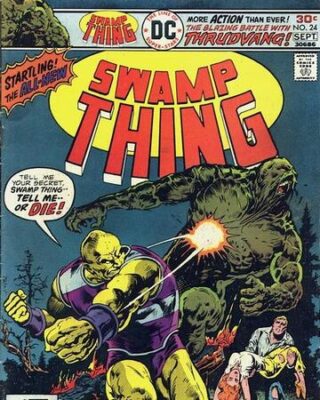
Kraft: When I went away?
Alex: Yeah.
Kraft: Yeah. When I went away and then suddenly, discovered I had no work, and came back. What happens is, it’s not strict but it works like this, you kind of work your way up. See, you start at really, really low rates and you start doing, horror stories, or whatever. And then you keep going, and work comes your way, and eventually, the goal of everybody in those days was to go freelance. When you didn’t have to work on staff, and you had enough writing, or art to support yourself.
When I went away, I reset to start. I went from having three books at Atlas to having nothing anywhere. For some reason, Gerry Conway always liked my work.
Alex: There you go.
Kraft: And that was nice. He was an editor at DC and he…
Alex: He had just jumped over to DC around that time then.
Kraft: Yeah. And I didn’t approach him. He approached me, which was great because I’ve never been that good at selling my stuff. I’m usually better, if you give me an impossible assignment, I will rise to it, and awe you and stun you, if you ask me to pitch something… God help me.
Gerry came and said, “You should come over to DC,” and I’m like, “Okay.” He offered me a pretty good rate. And that’s how I ended up doing that spell at DC. Then when he went back…
Jim: Can you talk about those books a little bit?
Kraft: Yeah.
Alex: Yeah, they’re Richard Dragon, Kamandi, Swamp Thing. How was working on it? Was that pretty easy for you? Or did you kind of have to get some background on those characters since they weren’t like the Marvel stuff that you had read while you were younger?
Kraft: Well, everything, even the Marvel stuff, I would do that. Like when I did Man-Wolf, and wrote J. Jonah Jameson. When Len Wein was editor, he called me in and he… I had Jonah calling Spiderman, the wall crawling weasel. Len said, “He would never say that.”
Well, I’m a research guy, so I pulled out the Stan Lee books with all the Jonah, and I’m like, “Right here, he calls him a wall crawling weasel.”
Alex: Ha!
Kraft: I try to keep the characters in character. Those days seem they’re gone, but Stan had a voice for every character. You could not, as Steve Gerber used to say, “You could take a DC book and here’s Wonder Woman, Batman and Superman, and whatever they’re saying is basically plot. It’s in service of the plot. They’re not real characters.”
You could change the tails of the balloons; it would make no difference. Marvel was never like that, which is why I like Marvel. It was all character driven. You could not take a balloon from The Thing and put it to Spiderman. It’s impossible.
I always would research the back issues to see the speech patterns, and the behaviors. Basically, to try to keep everybody in character. I did that also at DC but… God, there’s so many stories.
Like on Swamp Thing, I wrote the last issue of the first period.
Alex: Yeah, issue 24.
Kraft: Yeah. I also wrote 25 and 26 [chuckle] but they were not published.
Alex: Okay.
Kraft: Well, 25 was drawn, and 26 was not drawn, it’s just scripted. I always liked Swamp Thing. If you think about it, and if you look at the different companies, it wasn’t just an implosion. First there was, when the code loosened up, and they were like, “We can do all these things. We can do zombies.”
Suddenly, there were all these kinds of monster books. Then the monster thing kind of collapsed. I mean, it’s easier to see in hind sight than it is when you’re living in the moment. Pretty much all the monster books got cancelled. Man Wolf, Swamp Thing, all of them, with the exception of Tomb of Dracula, thank God, because that was a good book.
Jim: That was a good book.
Kraft: Anyway… Yeah, really, it was. I used to always try to get it to edit, in the office. Don and I would fight over the good books. Verpoorten would bring in that day’s books, “These are in and we need them by four. [grumble]”
[00:25:02]
Jim: Gerber’s Man-Thing. That was another good…
Kraft: Yeah, Man-Thing was damn great.
Jim: That was good.
Kraft: I would try to grab all the good stuff. And Don would try to grab it, but I would generally win. [chuckle]
Alex: Oh, Don McGregor?
Kraft: Yeah.
Alex: Oh, that’s funny.
Kraft: We had desks side by side while we’re editing, under Roy. This is what’s weird, there was Roy, Don and Me, doing the entire color comics, Marvel-like. I mean, that was it. It wasn’t like today where 4,802 editors.
When they would bring those books in, there were books that weren’t so exciting, and there were books that I love, like Starlin’s work, or Tomb of Dracula. Marv was on staff, but he was doing the black and white books, but he was writing Tomb of Dracula.
Yeah, I always tried to grab the better stuff… And I liked Doug Moench’s Master Kung Fu too.
Jim: Yeah, I was going to say that as well. That’s my favorite period at Marvel. I mean, besides, obviously, the classic. That was always, for me, bigger than when Shooter came on and the other stuff. I loved that era.
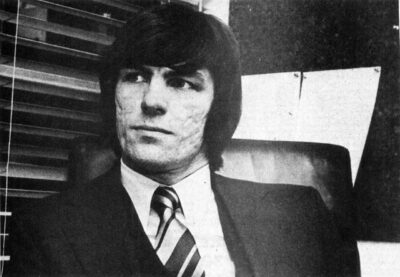
Kraft: Don’t get me started on that. Shooter’s a good guy, but his influence on Marvel was to turn it in to a DC kind of thing, with the editors and assistant editors of the books, all that kind of stuff. Marvel used to be, and I’m talking about my period. From what Gerry had said, and what Roy had said, things were different before my period.
It’s like when you’re born. You’re born, and the world seems like normal from the time you’re born. You have no knowledge of before that. Well, when I came in to Marvel, Roy was so busy writing books and editing, he spent his attention on the big things. “Here’s a new character. Here’s the top books. Let’s make sure the villains don’t repeat.”
Advertisement
Once or twice a year, you’d go in with a book like Man-Wolf or Killraven, or Black Panther, and you’d say, “I plan to do this.” He’d go, “Okay.” And then really, unless you really fucked up, or you tried to push boundaries, which Don was always doing, you’re pretty much left alone.
Because we were on staff, there wasn’t anybody over us. There was no editor of those books. We were the de facto editors of our own books. They would go to press, and Roy and Stan would see them after they were printed. Those were like cool days. But then…
Jim: Were they a lot looser then than in DC in terms of like the…
Kraft: Oh, there’s no comparison. During my period at DC, and part of me smiles at this, and part of me is like, “Yeah, yeah… You were just being stupid.” DC was so regimented. And Marvel became this, later.
DC had these offices with glass fronts, and it was like a menagerie or zoo. Each one had an editor in it. You know what I mean? You can walk along and look at them. And they all had suits and ties… They had no clue about how to do real comics, in my opinion, of course.
Jim: Was it true that Stan Lee is the one that took you out and bought you a suit?
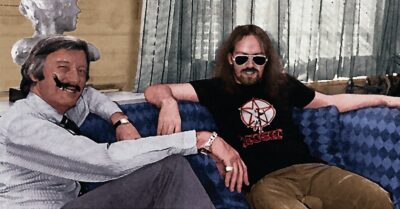
Kraft: No, but if you want, I’ll tell you that. He gave me a lot of advice though, I asked him.
Anyway, when I was at DC, you know how you react against things? Well, I was hippie-esk anyway, had hair. I think I had three hairs back in those days, and they were long. It was so non-DC, because everything there was so plot driven and so anal.
I used to make it a point, I spent a summer, going around barefoot, with my knees hanging on my jeans. And it would delight me to go to DC because it was so obvious how much they hated me.
[laughter]
Alex: Right. Because they were basically ‘suits’, and you were the hippie walking in the room.
Kraft: Yeah, and I really did not belong there. I just couldn’t help myself.
Alex: That’s funny.
Kraft: Anyway, when Gerry went back to Marvel, I followed him back to Marvel. Where I actually belonged, because that was my sensibility.
Alex: I see. There you go.
Jim: Two more DC books before you go back to Marvel….
Kraft: Okay. Well, wait, let me finish the suit question because it’s part of all these.
Jim: Oh, yeah.
Kraft: What happened was, when I went back to Marvel, I was always… You know, when you’re yourself, you don’t notice these things. Looking back on it, I realized I was kind of a dichotomy. Because, I was a hippie but I was also a motorcyclist, and instead of being a motorcycle guy or a hippie, I was a hippie-motorcyclist guy.
I always looked like that too. I never got hassled on the streets. In those days, Manhattan was a pretty rough place. I never had any trouble because I looked like the guy that would be causing it. So that was cool. At a certain point, in regards to the suit question, what happened was, I was in meetings with Stan because Steve Gerber had done the Kiss book and then moved to Las Vegas. He even borrowed three hundred bucks from me to do that. In his favor, he actually paid me back.
Alex: How cool.
Kraft: Who does that, right? I was left in charge of the Rock books. We had a meeting, Stan and Jim Galton who was CEO, and me. I was pitching the Beatles book and Galton would say, “They were sort of like the Monkees, weren’t they?”
[laughter]
Really clued it in, I got to tell you. I would say, “No, they’re a whole thing on to themselves. All of rock music from them onwards is influenced by them.” I would say that but Galton would not look at me. He would look at Stan and go, “Oh, so this and this and this.” And then Stan would look to me and then I would answer, and then… You know, I just didn’t exist in that room.
I decided at that point, I was wearing an inappropriate superhero costume. And I decided that I would change overnight, into suits and stuff.
[00:30:01]
Stan really did have an open-door policy. I mean I talked to him about all kinds of things, but looking back on it, never once about comics. [chuckle] I’d go in and go, “I want to change. I don’t want to tell anybody but over the weekend, I’m going to totally change. Cut my hair, get a suit. Do this, do that.”
Stan said, “I’m really glad you said that. I would never have told you to do it,” He said, “Here’s the thing, at one point, that hairstyle and that dress, meant something. When you hang on to it, you become an ‘anachronism’.” He’s like, “I’m so glad you’re going to change.” He gave me places to go to buy stuff, and you know, all that kind of stuff.
Alex: Oh, that’s cool. And this is in 1978, when that happened, right? When you did Marvel Super Special 4 – The Beatles, and The Marvel Super Special 7 – The Sgt. Pepper’s.
Kraft: Yeah. Yeah.
Alex: Okay. I got you.
Kraft: He was a great source of in– He talked to me about stock brokers, all kinds of things, just never comics. Probably a good thing, because from what I understand, he was really hands on. But in my day, he had bigger goals, so he was looking at a different direction. The end of that story is, after that, I had meetings with Galton without Stan. Because he could actually see me, which was my experiment. [chuckle]
Alex: Wow. Social experiment.
Kraft: I had a bad effect on the bullpen. Marie Severin loved the way I dressed. She actually followed me around the halls going, “This is great. I love this.” Before that, everybody dressed like helter-skelter. After that, people including Shooter, who was new, they started wearing suit coats and ties, and all the rest of them.
Jim: You’re responsible for that?
Kraft: Yeah, don’t blame me though.
[chuckle]
Kraft: But here’s what happened. Because of the response to me, other people saw that and they were like, “We should dress up too.” The difference was this, since I was freelance, I could go home and dress any way I wanted. Including coming to the office any way I wanted. But because they were on staff, once they started that, they couldn’t go back.
Not to blame Shooter entirely because there’s some blame attaching to me. But eventually, it became DC. You had all these editors with ties and coats, in little glass offices. You know, the very thing I hate, which is at the moment that I failed, and went back to publishing.
Alex: There you go. Okay. Right now, I get it.
Jim: It seemed like at DC, you were kind of closing out, maybe not intentionally but you were doing the end of the line stuff for various comics and one of those, they weren’t the last two issues but they almost were, on Blackhawk. Was that a weird comic for you to be doing?
Kraft: It wasn’t like I was really familiar with Blackhawk, but somewhere in my youth, I had come across some of those early Blackhawks and I really liked them.
Jim: The Reed Crandall stuff?
Kraft: Yeah. Yeah, the good stuff. That was cool. But there’s a great unpublished Blackhawk story. When Gerry was editing that, and he’s like, “Here, do these.” We stopped near Times Square, at a Dunkin Donuts. We were sitting there, plotting together, “What should we do?” And Gerry was like, “We should kill Blackhawk and we should do this and we should do that.”
His ideas were really cool. I thought he was serious. I nearly made a fatal error, [chuckle] by going, “Yes! I should go home and do it.” And then he went, “Just kidding. We can’t do any of that. We have to stick with the way the company did that stuff.”
Gerry was much more creative… There’s nothing wrong with his work, but he couldn’t bring all of it to his work because he was aware of what was acceptable and what wasn’t. I did what was acceptable, but I would’ve loved to have done… He was often running.
Gerber went through a period where he hung out a lot with Gerry. He used to say, “That guy knows, really a lot. He’s not like you would think from his work, and blah, blah, blah.” He was always conscious of what market, and what editor, and what company he was working for.
Jim: That’s really interesting. Because I remember reading a Conway science fiction novel when I was really just a kid. I thought, this is actually pretty good. He was never one of my favorites in terms of, at Marvel or at DC, but I really liked that. I wondered if he could do more than what he did.
Kraft: He went on to a long TV career, story editing and writing.
Jim: Yeah.
Alex: Let’s talk a little bit about FOOM. That was a fan magazine of Marvel that was started by Jim Steranko in ’73. You edited issues 15 through 22 from 1976 to 1978. How did you get that gig and that first issue 15 was the Steve Gerber – Howard the Duck issue, right?
Kraft: Yeah.
Alex: Tell us about your time at FOOM.
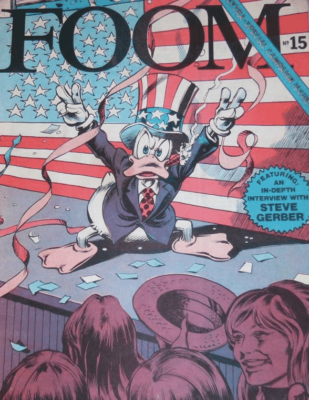
Kraft: Well, remember, I was coming back from my big days as Steve Englehart when I arrived on the West Coast with no work. [chuckle]
Alex: Right. Right.
Kraft: Then I returned. It was during that period where I was getting work, and trying to re-establish. I always liked Sol Brodsky. I didn’t know him when he bought my stuff at Skywald. Wwhen I met him at Marvel, Sol used to intimidate me, and a lot of people. When people were messing around, because Marvel was not DC, so people would be squirting each other with squirt guns, or throwing paper airplanes, or doing whatever. Dueling on desk tops. He would walk by the door to the editorial room, and he would just stop and stare, he wouldn’t say anything. That stare was like Gorgon. It could turn you to stone.
[00:35:03]
[laughter]
Kraft: And I was usually working, not actually messing around. Nonetheless, I turned to stone too. When I came back, after my hiatus, high on acid I must say.
[laughter]
Kraft: Statute of limitations has expired, I think.
Alex: There you go.
Kraft: I was telling Salicrup how I always found Sol intimidating. He said, “You should just go talk to him. You’d find, he’s a nice guy.” So here’s me, all hopped up…
[laughter]
Kraft: I knock on Sol’s door and I go in, and I just… And I’m a big one for confronting things. If there’s going to be things, let’s just confront them. I went in and I said, “You know, you’ve always intimidated me, and I don’t really know why. But you’d stop at the door and stare.” And he said, “I never once was staring at you.” He said, “There was no point at which you were not doing your stuff.” And he said, “You know, it’s comics. But we have deadlines and you have to get books out. It’s my job as vice president, to make sure people actually sober up and do their shit.” After that, we became swell pals.
Alex: That’s awesome.
Kraft: I would go to him for advice. So anyway…
Alex: Yeah, because I…
Jim: Did you ever tell him you were on acid when you were having that conversation?
Kraft: [chuckle] Yeah. Well, I was on acid for 30 days at that period.
[laughter]
Kraft: Here’s why and how. I don’t know how to find drugs, I never have. If they cross my path, I’m exaggerating for effect, but if Keith Richards said, “Let’s do heroin on our eyeballs.” I’d be like, “Well, it’s Keith Richards and he has heroin, why not.”
Alex: Yeah.
Jim: [chuckle]
Kraft: If wouldn’t go, I need to shoot heroin in my eyes, but if it happened, I’d probably be there for it.
Alex: That’s the Pacman Philosophy, right? It’s in front of you.
[laughter]
Kraft: Yes… Well, I had that Norton 750 that I put in the Man-Wolf books. At that point, I was living in Queens, and there was this guy, George. He wasn’t a true hump back but kind of. He stopped to admire my bike and we were just chatting. It turned out that he was like a drug guy. He had stuff and he’s like, “I’ve got acid.” He pulls out this baggie with these tabs.
My thinking, being very… This is the dichotomy that is me. I’m thinking practically. I’ll probably never see acid again [chuckle] I don’t know how to find it. Here’s the thing, I thought, there’s a whole bag of it, why don’t I just buy all of it. [chuckle] because I’ll never see any of it again.
Alex: That’s hilarious.
Kraft: That’s what happened. I was like, “I’ll just take all of them.” And so, I took acid every single day for 30 days till it ran out and I never did it again.
[laughter]
Jim: If we go back and read your comics of this period, can we spot, “Oh, this is during the 30-days of acid”?
Kraft: [chuckle] No because, here’s the weird thing, fans are always going… And I’ll say this about Stan and Ditko, and everybody. They’ll go like, “Oh, they must’ve had good stuff here.” Stan and Ditko were the straightest guys on the planet Earth. They were never on anything.
Whenever I wrote, I was never on anything. I mean, I only did it when I wasn’t. When I’m writing, I have to be a 100%, or at the worst 99. I have to be really on it. I can’t be drunk or stoned, or this or that. No matter how stoned the thing reads, I wasn’t. Yeah, you wouldn’t spot it, but the influence of it.
What it did for me was, I made a lot of mental connections, pattern sensing and seeing the world in a different way, and stuff like that. I think for me it was very beneficial. I never felt the urge to do it again or anything. It wasn’t because I had a bad experience. I would say they were all pretty good. I’ve been there, done that, whatever.
Alex: Yeah. Right. It was that you didn’t have that addictive personality.
Kraft: What I do is, whether it’s coffee or alcohol, or even food, I take time out. I’ve taken a year or two off alcohol or coffee. Just this year, I didn’t eat a single bite of food for 28 days. I’m not even addicted to food.
Alex: Now, when you were doing those FOOM issues, did you kind of look back at the Steranko issues, or did you say, “I’m going to do kind of my own take on FOOM.
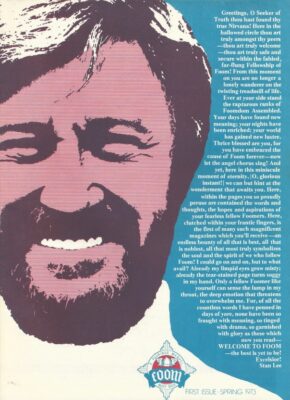
Kraft: What happened was, because I was looking for work, as soon as I talked to Rich, the next door on the right was Sol, so I went in there looking for work. He was the champion of no budget. I learned a lot from Sol, later when I was publishing. I’m like, “Here’s my page, rate: a half of a cent.” The budget for FOOM, the entire magazine, all the art, all the writing, was 750 bucks. Produce a magazine for that, I dare you. [chuckle]
My job was, how can I do this, and still actually make anything at the end of it. I had met this legal secretary named Donna Co, who is credited in FOOM. She could transcribe faster than you could talk. What I did was, I did the Infoomation section, where I would talk to each of the different editors and writers, and then I would give it to her to transcribe, and then I would edit it into something resembling English that you could read. That’s how I got that done and got it done with not a lot of money and stuff.
Alex: I see.
Kraft: And I wrote a lot of it, and so on. Mainly, I just had a lot of fun with it. I got to interact with Kirby a lot…
This is a whole other topic. People who weren’t there don’t know anything about it, are absolutely certain they know everything. And they haven’t dealt with Ditko. They haven’t dealt with Kirby or Stan.
[00:40:01]
They really don’t have a clue. They know what they think is reality, which is not even close, I love Kirby’s work. I even wrote him a letter about the Captain America Bicentennial, and stuff that I have on my Facebook page.
The reason why he was such a good collaborator with Stan is, Stan was the man of words, and Jack was the man of art. Jack wasn’t so good with words, which I think you could tell if you read anything that he actually wrote. I was trying to actually publicize his books when he came back to Marvel.
Advertisement
Okay, there’s a book added to the schedule called Devil Dinosaur. Here’s me, because I’m trying to boost this in FOOM. I’m like, “Tell me about it. What’s the origin of Devil Dinosaur?” Jack pauses for a while and he goes, “He’s red. Yeah, yeah, he’s red.” [chuckle] That’s what I had to work with. I did the best I could under those circumstances.
Alex: He’s more about action, right? I mean he’s expressing himself as a visual thing.
Kraft: Yeah. He had these ideas…
Alex: He’s not saying it though.
Kraft: Yeah. His ideas tripped over themselves… somebody like Stan kept him on course. He may not have thought so, but if you think about it… Here’s the Silver Surfer, in the next issue, it’d be something else. It’s always something else. Look at that DC stuff. It’s one thing after another, and nothing has any continuity to it.
Stan would be the guy, “Let’s not lose the Surfer. Let’s bring him back. Let’s do this. Let’s not jump so fast.” I mean, there was a reason why their collaboration worked well. Stan may not have been the best with ideas, but he knew his stuff. Stan was a sharp guy. Kirby was brilliant. And him and Stan together… I’m sure Kirby was like, “He used to sharpen my pencils, why do I have to listen to him?” Really, that was their best work.
Alex: That’s interesting. Kirby’s brilliant, Stan’s very sharp wit about it, and together, that makes for a really powerful thing. That makes sense to me.
Kraft: Yeah… Because, if you let Kirby write it, he could have a good idea and not even know it. Just throw the baby out with the bath water, on to the next idea. It’s like hold on a minute, take some readers along, build some stuff up.
I think, why he always thought he was the writer is, because he was kind of the plotter, and he thought that was writing. I don’t think he ever could comprehend that his writing, and Stan’s writing were worlds apart. Stan brought this whole, two or three other levels to it. Jack would just be like, “It’s a giant rat.” It’s like, “Wehh… Your art is great and your writing, not so much.”
Alex: When you were doing Defenders, I want to as a couple of questions about defenders and Jim has some questions too. You really showed a knack for writing personalities into your characters. One of the celebrated parts was the 1977 Scorpio Saga story arc. You really gave each character their voice. Was that like, you kind of saw that in Stan’s writing and you felt like you wanted to do something similar, or did you actually feel like you were channeling the characters, or expressing different parts of yourself? How did that kind of worked out with Defenders?
Kraft: I would say it was the latter part. Keith was fun to work with, and Keith is a man of ideas. Over the years, I’ve collaborated with all kinds of people. Here’s my favorite. I come up with something that I think is cool, and I give it to them, and they think, “That’s cool, but watch this.” And they up right back you to write. And you’re like, “Holy shit.” Then you have to up back. That’s the best kind of creation.
Alex: And you’re talking about Keith Giffen, right?
Kraft: Yeah. Yeah… Keith and various other artists that were like that, like George or Ed Hannigan. And then there’s people like Carmine Infantino. You give them something and they give you back one tenth of what you gave them in your plot. Because they’re lazy and they want the money… There, I’ve said it. I’m sure there’ll be people pissed off about it, but that’s a fact.
What you don’t see in the Defenders, the ones that were drawn by Carmine, is nine tenth of my plot. I’m looking at the Hulk punching this monster which apparently has hands, because in one panel he has hands but for the rest of the book, he does nothing. The Hulk just punches him, and the Hulk is in the classic Superman “I’m going to fly off”, one knee up pose. He doesn’t even swap the image. I’m looking at it and going, “The entire story is missing.” I better pull a theme out of my ass in a hurry. [chuckle]
Those are the collaborations I don’t like working with because lazy hacks.
Alex: I see. And you’re talking about Carmine after he left DC Comics.
Kraft: I’m talking about Carmine when he did those Defenders.
Alex: Yeah, from the late ‘70s, got you.
Kraft: Yeah.
Alex: Okay. Cool.
Kraft: It’s funny because, as fate had it, he was publisher of DC when I was doing my stint there. He’s the guy… Here’s why it was good that the monster… There’s a couple of reasons that the monster crash was good for me personally. We were in an elevator, Gerry, Carmine and I, at DC. Carmine turned to us and said, “From now on, I want Hawkman and Swamp Thing in the same book.”
[chuckle]
And I thought he meant, the Marvel stuff, like Tales to Astonish stuff where they had two 10-paged stories or whatever. And he goes, “No, in the same story. Every issue, from now on.” I’m thinking, Swamp Thing and Hawkman have zero in common.
[chuckles]
What the hell, right?
[00:45:00]
Kraft: The unpublished Swamp Thing, which was #25, was a battle between Hawkman and Swamp Thing. After that, he asked if the book had lasted, I didn’t know when he said that that it wouldn’t… I was racking my brain, I’m like, “What the hell I can do?” I said, “Well, I guess I’ll take Swamp Thing to Thanagar, or something.” I mean, when the publisher talks, you listen.
He had been the boss over there, and thank God they cancelled Swamp Thing before that and Man-Wolf, because when I left Marvel to go to Atlas, I had not finished the Man-Wolf saga, the Stargod thing. To me it was a set-up, I saw him as a real Marvel character that had legs. I hadn’t finished it. When Shooter came to Marvel, they offered him Man-Wolf because I had left.
We had lunch, when I was at Atlas. I explained to him basically what’s on that text page. You know, that says, “Here’s what was in store for Man-Wolf.”
Jim: Right.
Kraft: Where I tried at least to give the readers a kind of a closure. Jim’s eyes just glazed over, like he just didn’t really get it. Fortunately for me, they cancelled the book. And then, when I got back to Marvel, I was able to actually do the end of that particular sequence.
Jim: Those two more Marvel Premiere issues.
Kraft: Yeah. Yeah. I mean, in both of these cases, the Swamp Thing, which I think would have been horrible if Swamp Thing and Hawkman had to be together in the same story every issue. I was like, “Yeesh… I got off from that one.” The cancellation happened at the right time for me, but…
Jim: It’s so funny that Alan Moore actually takes him to Thanagar.
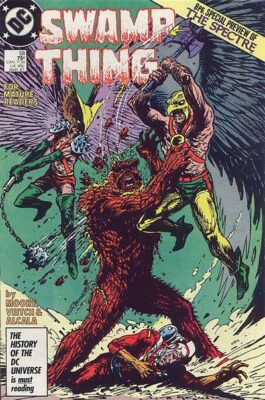
Kraft: Yeah. Here’s what’s also funny, I haven’t read those.
[chuckles]
I hear they’re good but… I’ve got the online thing but I just never seem to have time. I want to go see what he did to it.
Jim: They’re very good.
Alex: Also, some concepts that you introduced in to the Defenders, cold war, nuclear power, sibling rivalry, temptation, and interestingly, growing old alone. These are just really interesting anxieties that I think a lot of people had at the time. Was that conscious? Were you putting some of your own anxieties into the book? Tell us about that.
Kraft: Well, I’ll jump back to Scorpio because I didn’t get to say, I had the Scorpio concept. I knew how it was going to start and end, with the book ends I think with suicide, but the battle, I left with Keith. And Keith did some great stuff in the battle. When I was writing it, I tried to… You can’t have everything at just all dark all the time. I mean, contrary to how comics have been for a while. I tried to lighten the stuff with some of the banter when the fight was going on with Zodiac.
Well, Keith was beginning too, and if you look back at those Scorpio issues, and compare them to later on, like the Age of the Defenders when Sal was doing the art. Sal put all those characters, I don’t know how many there are, 30 maybe. He managed to put them all in. Unlike Carmine, who was cheating the whole way, he managed to put everything in my plot into the story, and still leave room for dialog.
Alex: Oh, cool.
Kraft: I mean, he was remarkable as a storyteller. If you look at Keith’s stuff, and I loved working with Keith, but if you look back, he was so new. He didn’t know to leave room at the, like when you change the scene, leave some room in the upper left, so you can actually establish that you’ve changed scenes.
Allex: For a caption box, yeah.
Kraft: Yeah, and when you’re fighting, there has to be some dialogs someplace, you can’t fill the whole panel. That was challenging to write because I’d be like, I can put one balloon under an arm here, and I can put a double dash on each side of one word. And I can put that over there… [chuckle]
I would rather go through that with somebody who’s creative than do some boring stuff. The Scorpio thing was probably my lowest point ever. I was massively depressed. I think that in art, I mean, who wants to be depressed all the time. People are like, “McCartney’s too happy.” Well what should he do, suffer for his art?
I think that particular story was because that’s where I was at that time. Some of the other were like, I was very upbeat at the time or whatever. Mainly, it was the deadline. Always the deadline.
What you would do, and I think, for me it’s a great way to work, and I understand all the side of people, and how comics has become. Which is, “Oh, you need to have your art planned in advance, blah, blah, blah. “God help us. There would’ve never been Howard the Duck, there would’ve never been anything I did because I had no fucking idea what I was doing. You know what I mean?
That Scorpio, I did. I knew what the story was, over three issues. By and large, you had 8.2 seconds to come up with a plot, and three more seconds to actually script the pages, and you need to bring readers back so you had cliffhangers.
Gerber was good at the cliffhangers and terrible at recovering. [chuckle] Which is why, all of us, at various times, would go out to dinner with him, because he’d be like, “Back against the wall, I’ve got to have a plot tomorrow, and I have no idea what I’m going… I did this.” And we would go out and kick ideas around and stuff. It was fun times but it was also the deadlines.
A lot of what you were asking me about the stories was, “Well, you need something tomorrow!” and it’s like, “Oh, shit.” [chuckle]
[00:50:04]
Alex: Can I say you’re putting in what you’re kind of thinking at the time.
Kraft: Yeah. Yeah, exactly. The best thing you can come up with. To me, the miracle is, now if I could go back, I would take… Defenders was pretty much the way I would do it, but on She-Hulk would cut about half of the dialog.
You know, but you’re doing the best that you can in the limited time you have. And we were all beginners if you think about it. I mean not all of us, certainly Sal wasn’t and so on. The rest of us, we’re learning in front of an audience. It’s like, “Go on stage, act and you better be good.”
All the things that made Marvel great at that time, and also the things that made a lot of those books not so great. You know what I mean? It’s like, “Well, somebody came up with something lame.” Or this or that, but I like that method. The anarchy much more than the structured thing.
[00:51:04]
© 2020 Comic Book Historians
